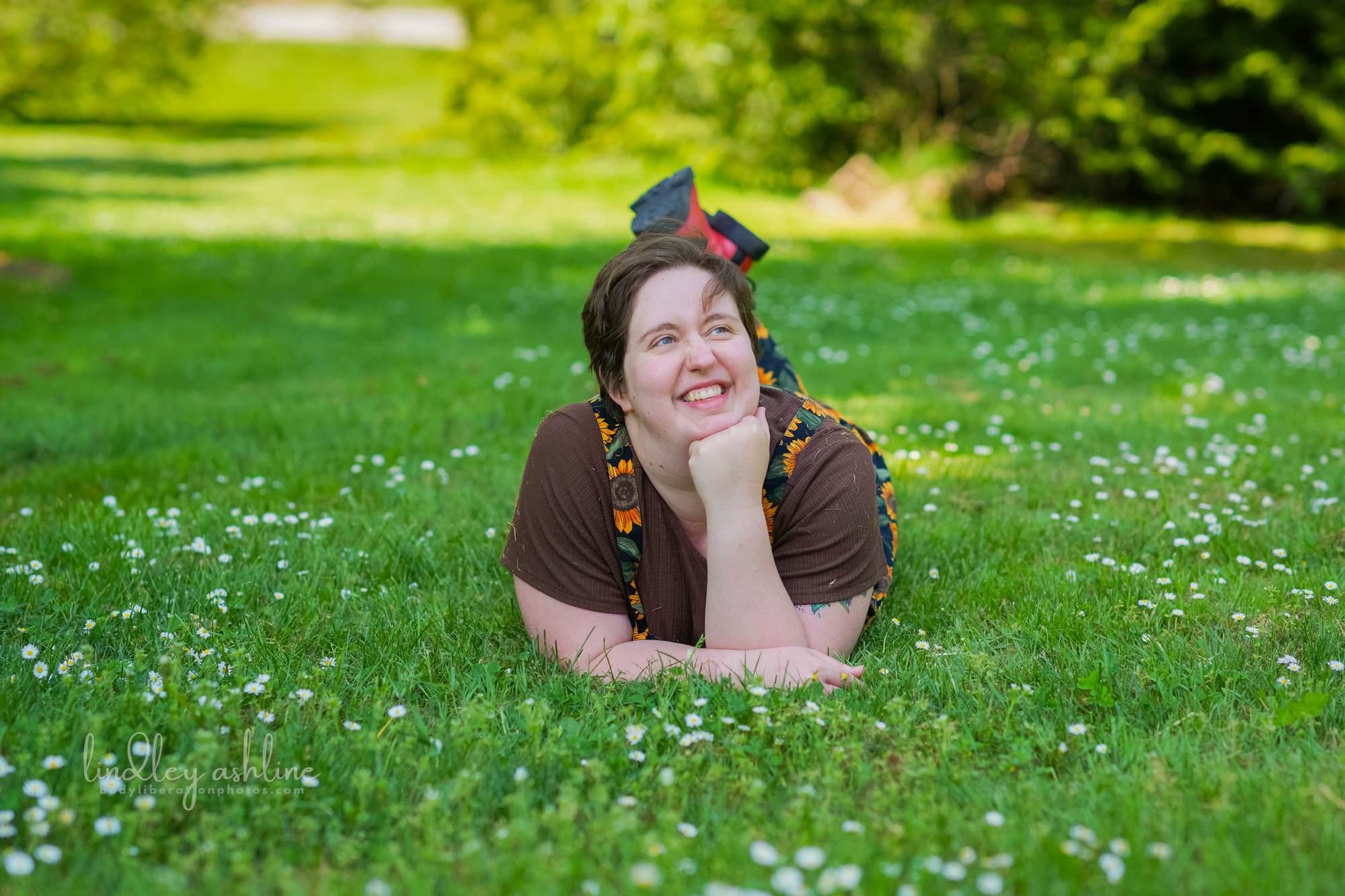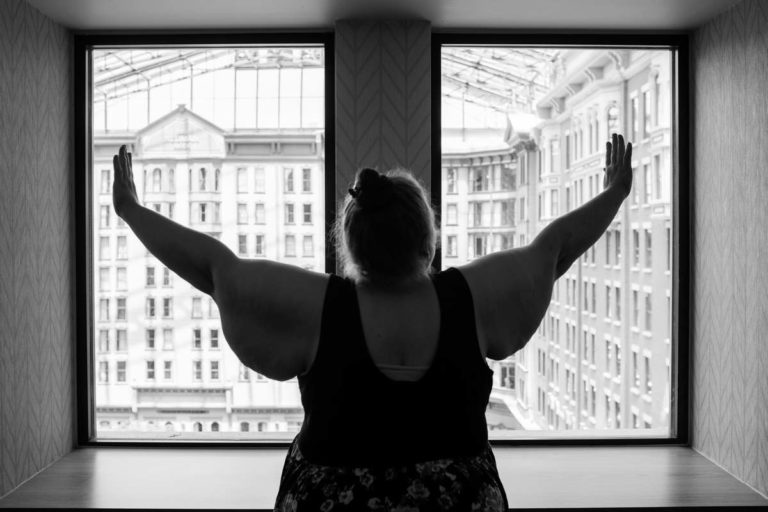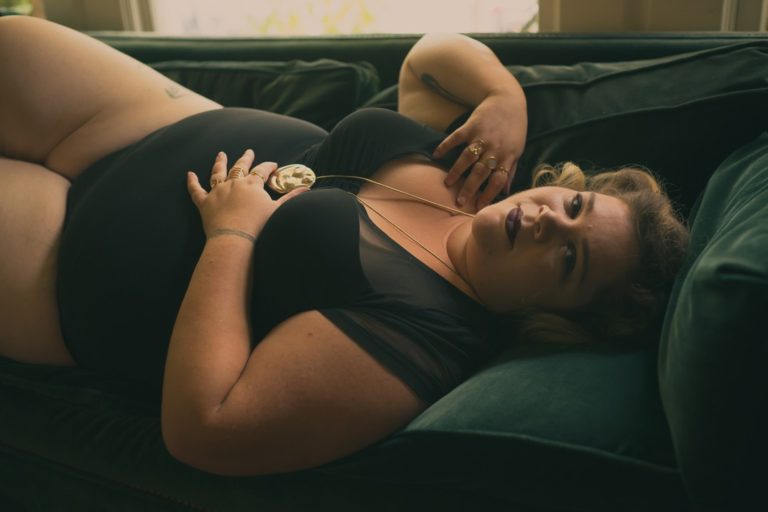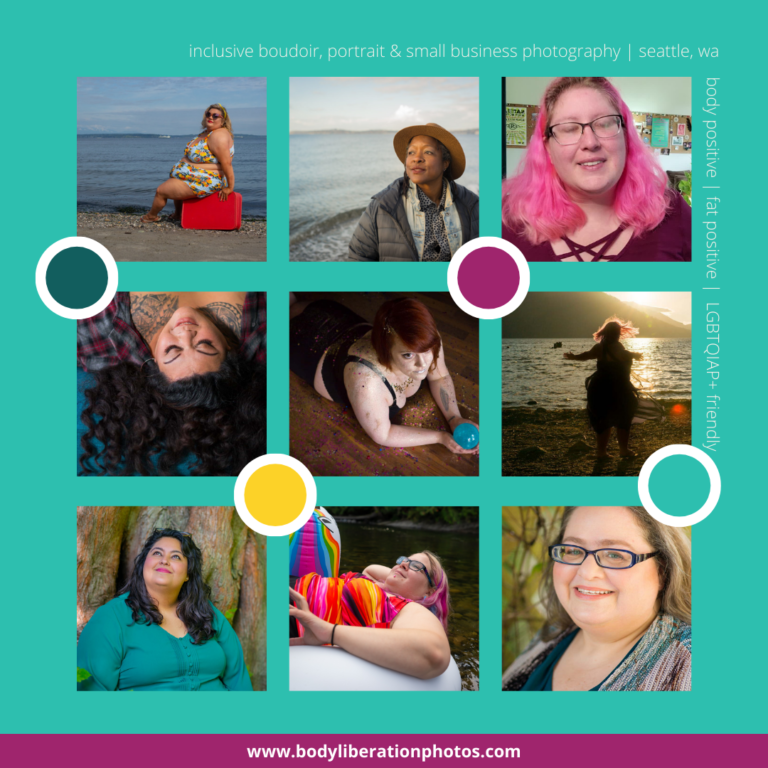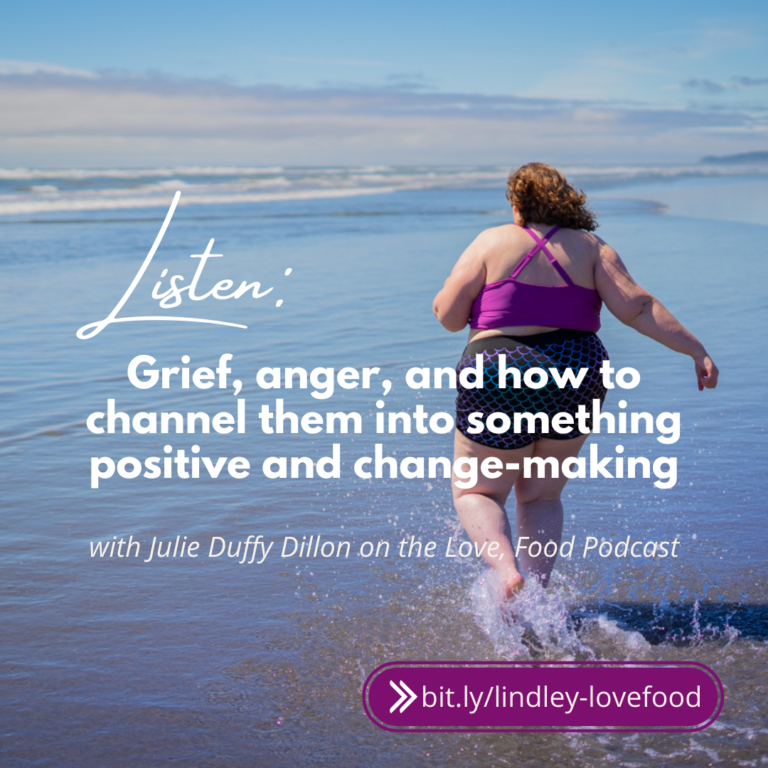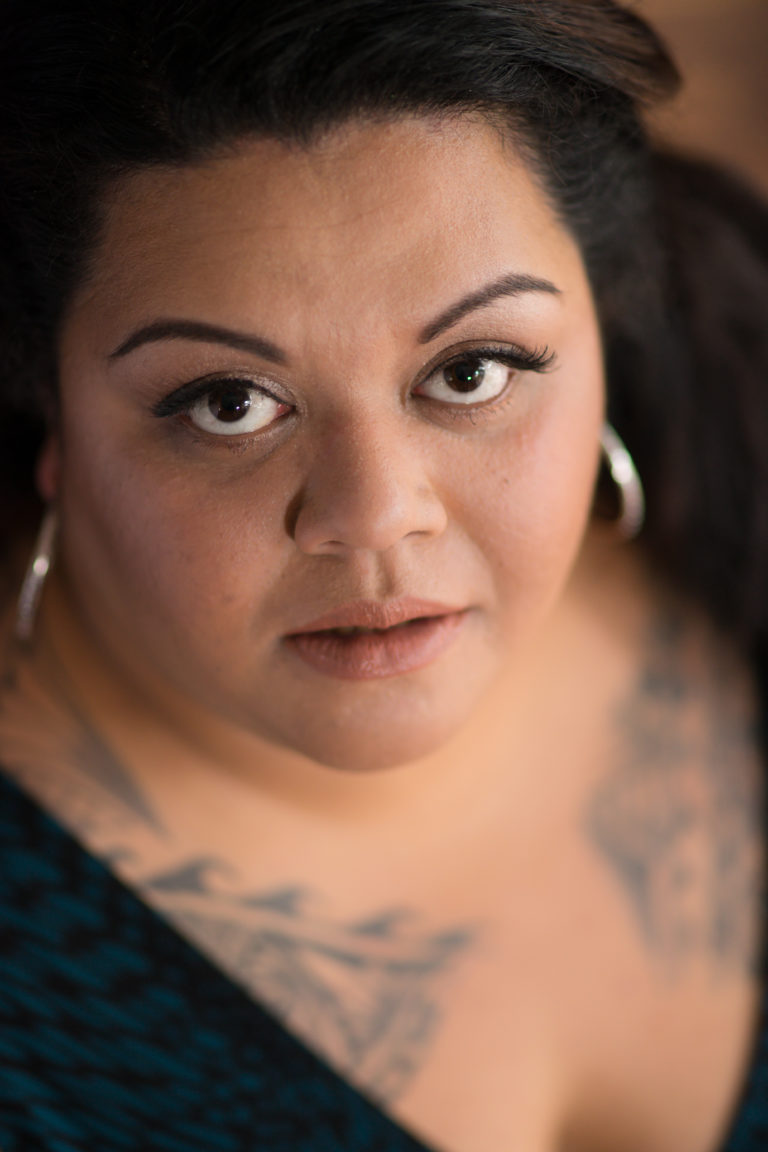Joyful Divergence {Seattle small business branding session}
What a joy this photo session is to share with you! So often, clients who come to me for Seattle body-positive small business branding and portrait sessions are just getting started with their businesses. It’s pretty cool to be the person who gets to help them figure out how to first represent themselves professionally and as business owners.
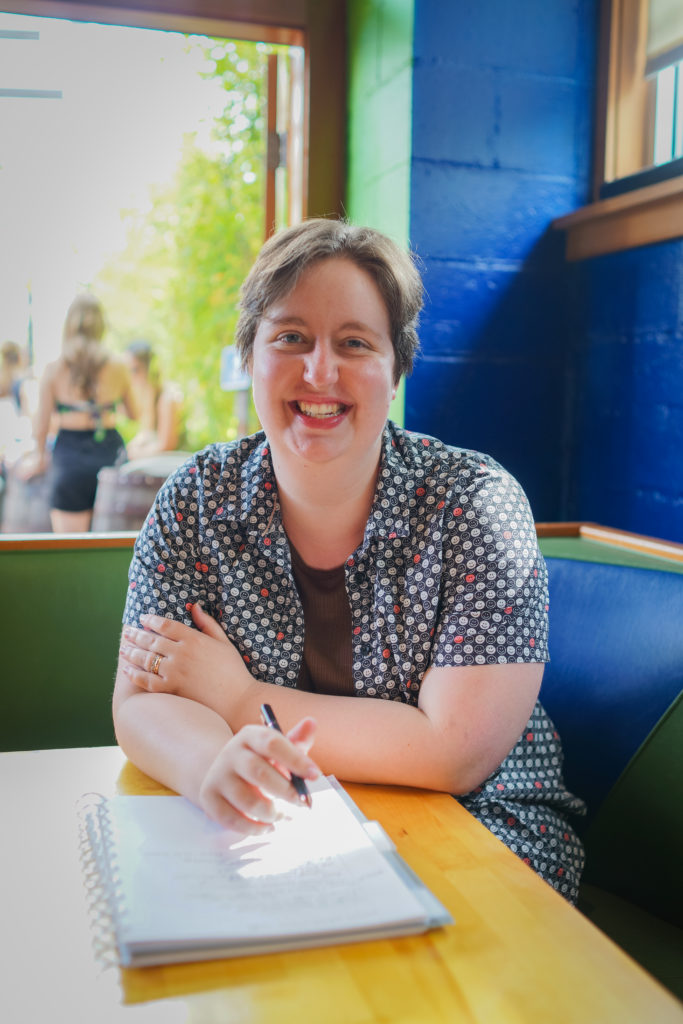
I also love, love, love working with neurodivergent folks. Y’all are my people. (Neurodivergence is an umbrella term that includes autism, ADHD, dyslexia and more, and depending on who you ask also includes mentally ill and mad folks.) At Kyra’s session, we cheerfully got distracted together by a hawk flying by and a rainbow, and laughed ourselves silly while getting Kyra covered in grass rolling down a hill.
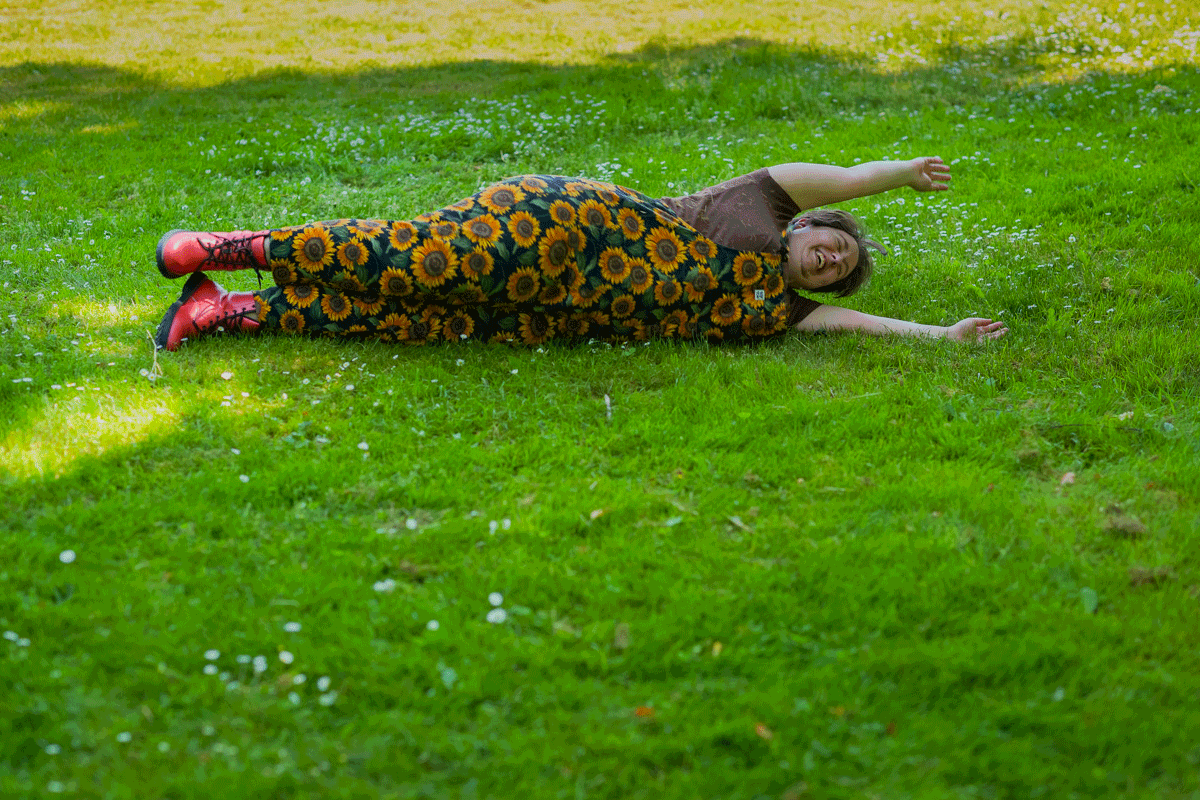
Beginning with this post, I’m now asking my business portrait and visuals clients to fill out an additional text-based interview to give you more insight into their fascinating stories and show you how those stories underlie the choices we make together about how they’re portrayed in photos. Here’s the story of client Kyra Sutherland of Joyful Divergence.
I discovered life coaching through a peer coaching community focused on cognitive thoughtwork (shout out to the lovely Kara Loewentheil) in the height of the pandemic, after years of feeling like I’d hit a plateau with standard talk therapy. Over the course of a couple years I used this community to tackle my body image, chronic pain, imposter syndrome, self confidence, and codependent relationships with my friends and family.
While unpacking all of these areas, I discovered the gender dysphoria that led to me embracing my nonbinary identity. I also realized that my nervous system reactivity wasn’t just the generalized anxiety diagnosis I had gotten in college, and that even when I healed the thoughts leading to the anxiety attacks, I still had said “anxiety attacks”… turns out they were very often sensory meltdowns prompted by the fact that I was masking autism, which unlocked a whole new area of work around accepting my neurodivergence.
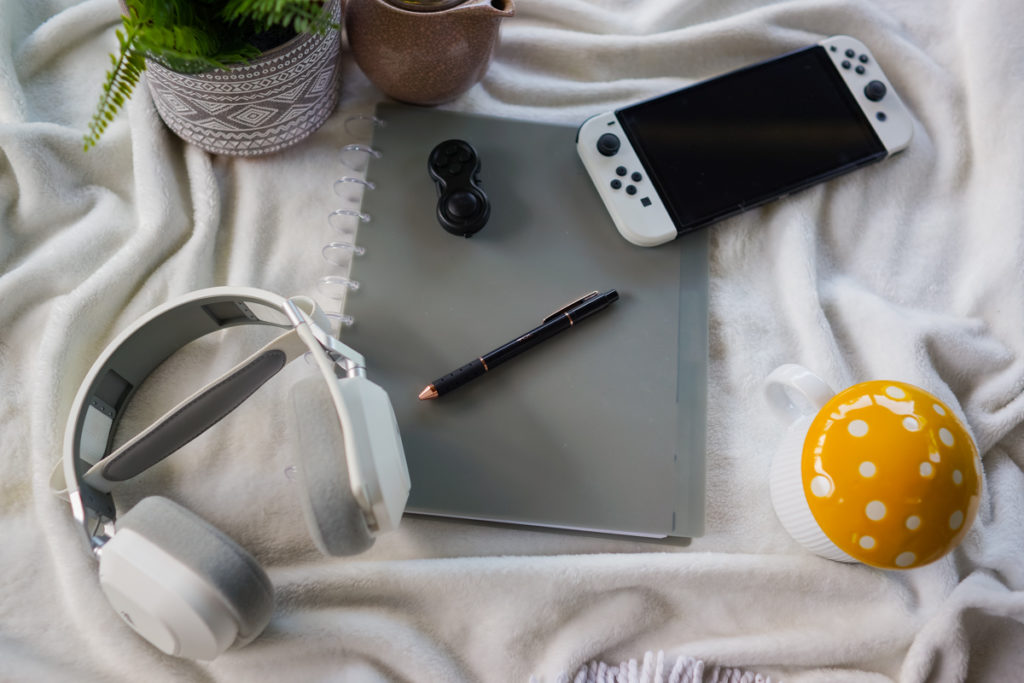
I got myself some additional tools to deal with the somatic (body-based rather than mind-based) experience of sensory sensitivity and hypervigilance from living on the autism spectrum in a world that isn’t designed for me, and unlocked a whole new level of ability to feel peace and joy in my life and actually FULLY relax and enjoy hobbies for the first time in decades.
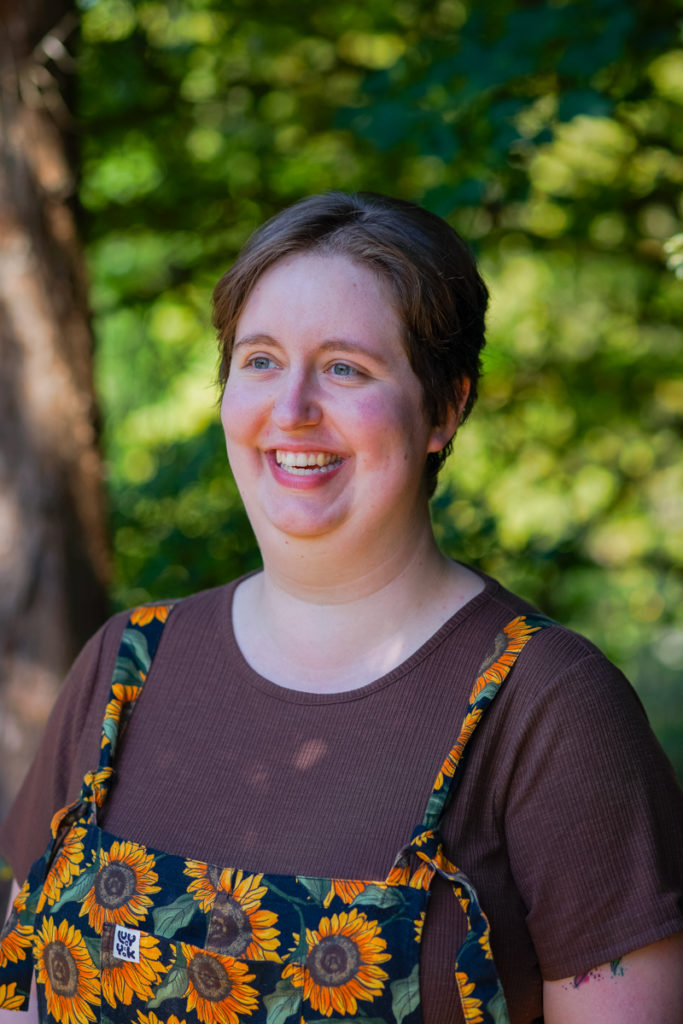
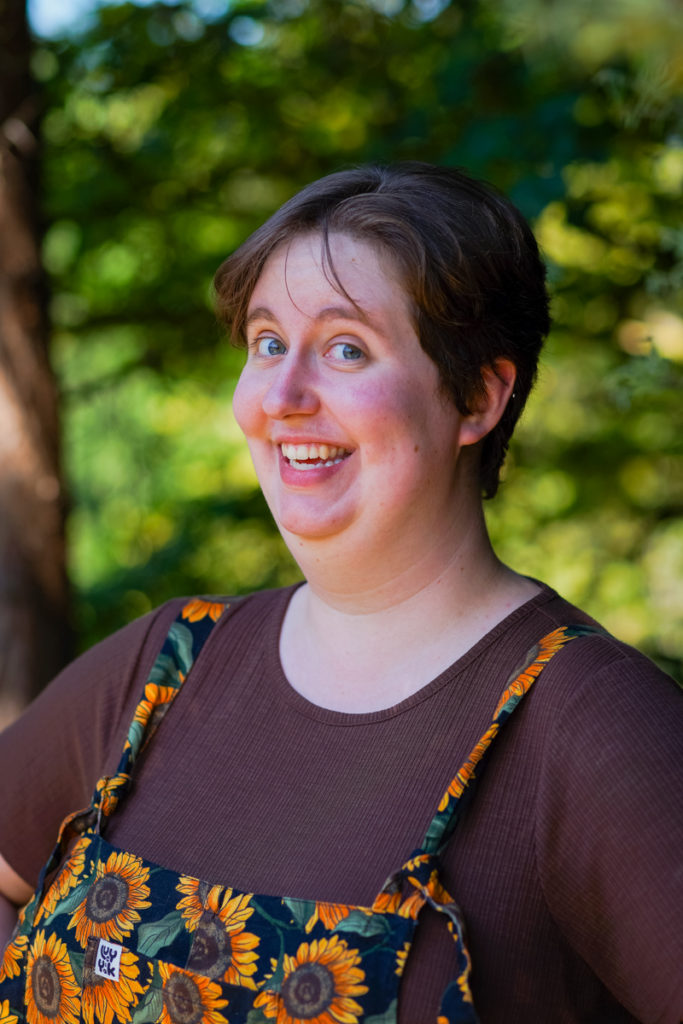
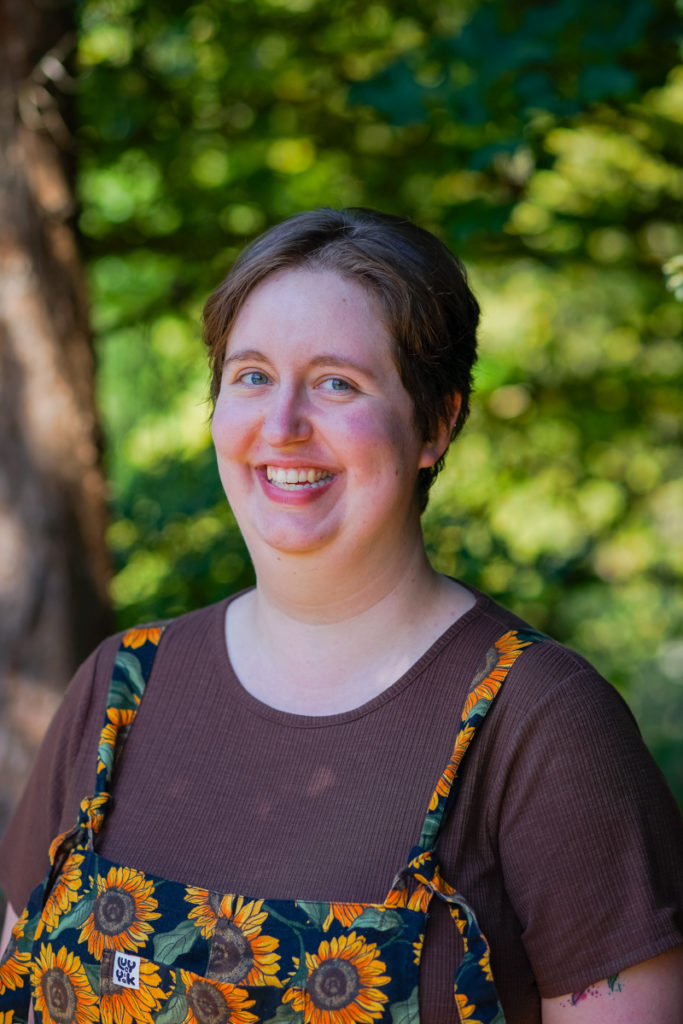
But I started noticing that the communities I was learning from didn’t have the whole picture of my brain. I kept hearing messages that I might be able to ground my way out of having sensory meltdowns, or that if I just shifted my thoughts in this way I’d feel totally able to connect deeply to the (neurotypical) people around me without worrying about being misinterpreted. The tools still mostly worked, but I frequently had to puzzle through my own modifications, nuance, or clarifications to fit my neurospicy brain. I enjoy that particular puzzle, but it didn’t seem fair that my community would have to always do that legwork for ourselves.
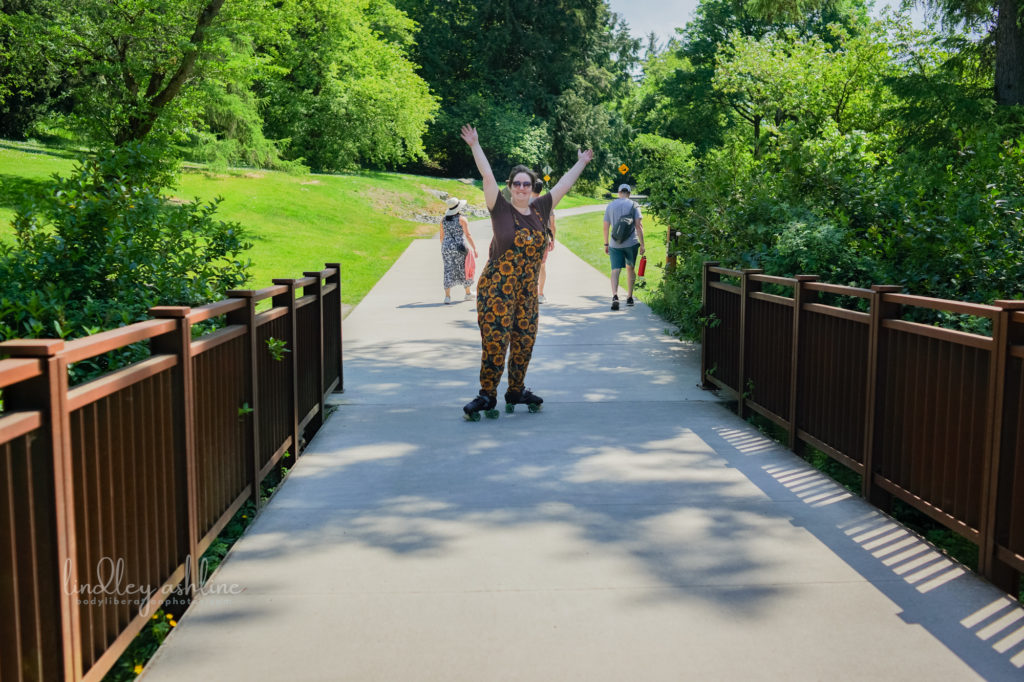
So I started my own coaching business, Joyful Divergence, where I help autistic and ADHD clients find their way back to joy and confidence! I’m so thrilled to have found this passion that allowed me to become my own boss, and that I get to help people unmask and find peace on the daily. When I’m not nerding out about neurodivergent things and coaching tools, you can find me curled up in my cozy corner with a good book or cozy indie video game, or on the track playing roller derby.
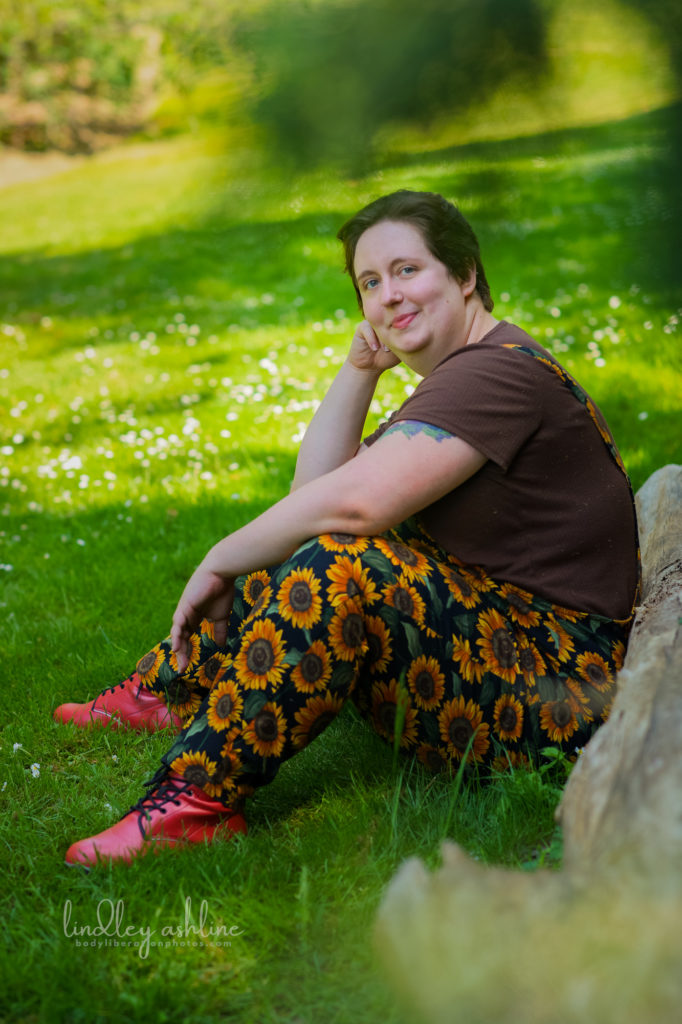
1. Tell me about you! What’s your name? What pronouns do you use? Where do you live? What do you like to eat for breakfast?
Heyo! I’m Kyra, I use they/them pronouns, and I live just north of Seattle in the ancestral lands of the Snohomish people with my lovely wife, one very dumb cat, and one extra sad pitbull. I found prepackaged smashed avocado at Costco recently, which has led to a hyperfixation on avocado toast for breakfast now that it’s easy to do. 😁
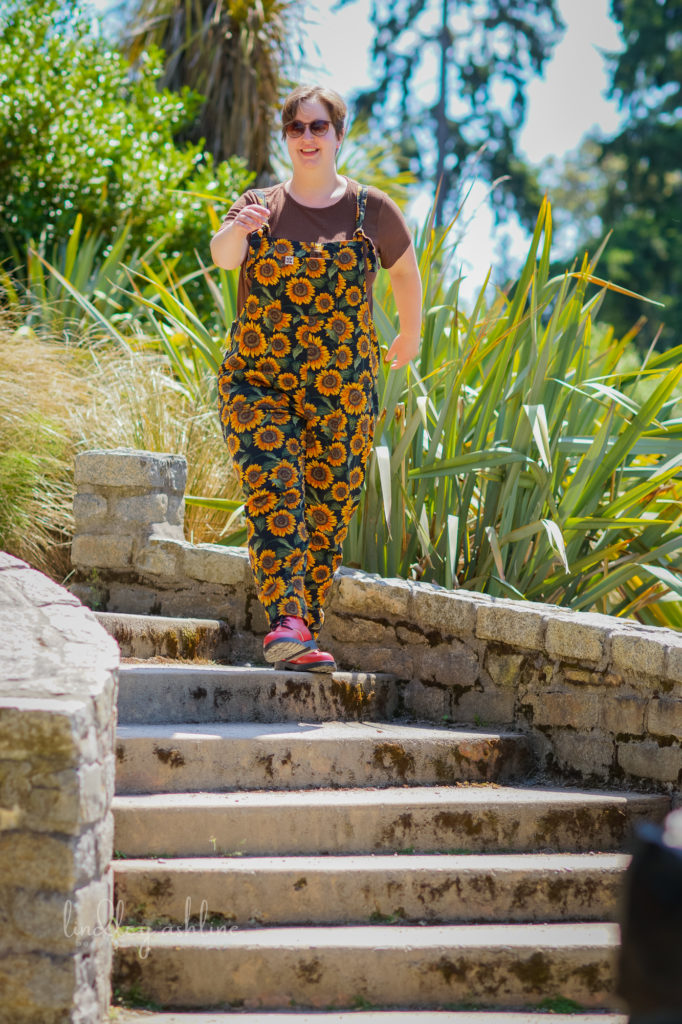
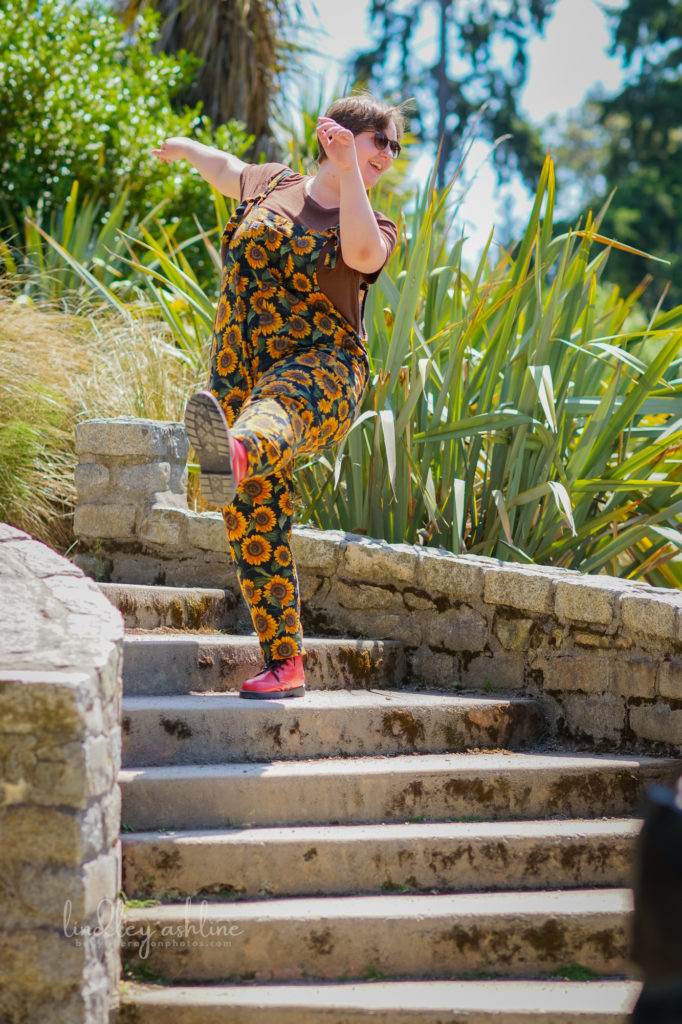
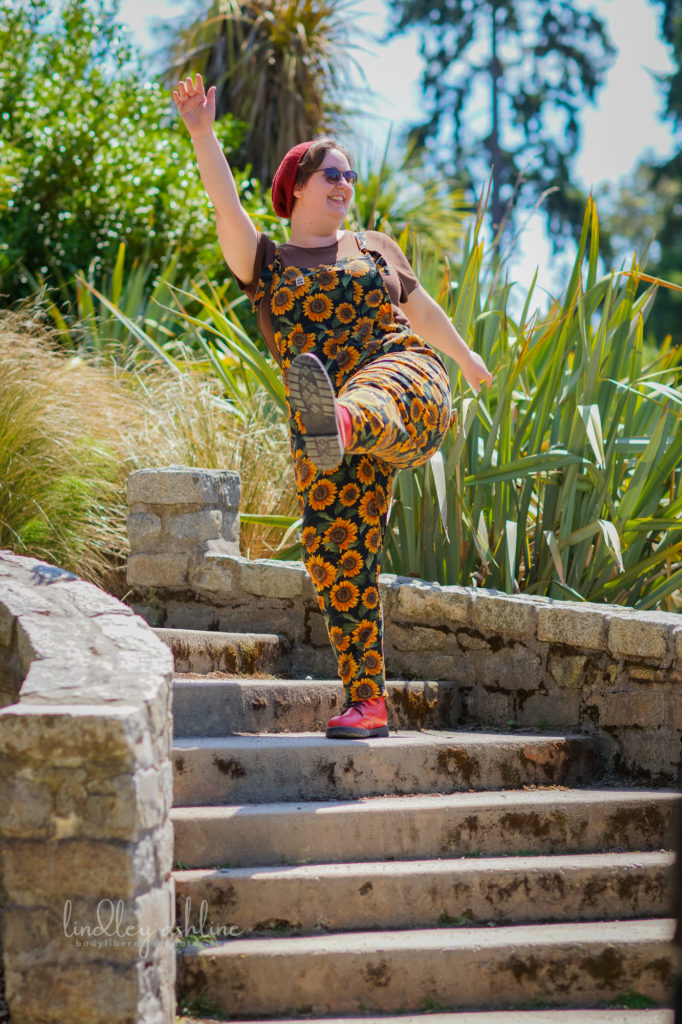
2. What is your business, and how does it make a difference in the world?
I recently started my own coaching business to help autistic and ADHD clients find their way back to joy and confidence. I help my client play with the tools I learned to heal my own self esteem, body image, and relationships, towards the end of finding more ease, joy, and confidence in their most authentic lives. I’ve found my particular coaching style is most helpful for those who, like me, are high-masking, late diagnosed, or undiagnosed and exploring possible explanations for their brain drama. I blend the tools I’ve learned with the lens of understanding my own socialization and neurology (and that of my ADHD loved ones), to help neurodivergent clients on a level that’s hard to find in the current life coaching landscape.
My coaching is one part accountability buddy, one part mindset shifts, one part body-based grounding tools, and all parts compassion and curiosity. I tell each client that this is their journey and what they want to get out of coaching is totally up to them, I’m just here to help offer some tools that have helped people like them and help steer the boat and keep focus on the goalpost.
I’ve found we tend to focus on a couple key areas where a lot of our community has absorbed messages that are keeping stuck: resting without guilt or shame, getting distance from the stories about one’s self-worth, actually processing emotions and activation through the body, and setting up and maintaining systems that will help with goal achievement (without holding myself to impossible standards like daily habits and massive lifestyle shifts).
Learning a different way of existing frees up SO MUCH energy to put into your relationships, passions, career, and communities. I have a teacher that says “When one of us heals,we help heal the world.” Every positive shift in my clients’ lives allows them to give more love, presence and intention to their loved ones and communities. Their healing cascades outwards, and equips them with better grounding to make the changes they want to see in the world.

3. Why is what you do important? How does it change the way people see or how they feel about their bodies?
Pretty much every one of my clients learned somewhere along the way that they are somehow fundamentally broken and wrong, and if they just “tried harder” to “be normal,” all the issues in their life will magically resolve. Trying to force yourself into the neurotypical box is exhausting and painful, and cuts you off from so much joy of living authentically and actually loving on your perfect selves. By helping clients take their power and agency back here, I’m helping more marginalized folks feel powerful enough to challenge oppressive systems in their own ways.
A huge part of this work tends to require feeling safe paying attention to your body, whether it’s emotional sensations, hunger cues, or desires and life goals. For those of us living in fat bodies, we have an extra layer on top of all the other socialization that makes this even harder: I can’t feel safe in my body if I’ve internalized messages about parts of my body being bad. If I’ve spent my whole life hating my stomach, it’s really challenging to tune in to my gut to notice tension and emotions without being bombarded by thoughts about what the size of my stomach means about me. So part of the journey to feeling safety is unpacking those body thoughts and practicing thoughts that serve you better.
I should clarify, because the pop media nature of positive affirmations has alienated a lot of folks, that when I say “practicing thoughts” I don’t mean trying to brute force thoughts like “I am a beautiful divine goddess” before you believe them. Rather, we work together with your brain to take small steps towards neutrality and get buy-in from all parts of your brain. We often start with things like “this is a human stomach” or “it’s possible some people in the world might find my tummy attractive,” and then build the neuroplasticity to reach towards the more positive thoughts on a timeline that honors your window of tolerance. I’ve seen these incremental steps make a world of difference in the way so many people relate to their bodies, so they can actually start to feel love, compassion, and peace when they look in the mirror.
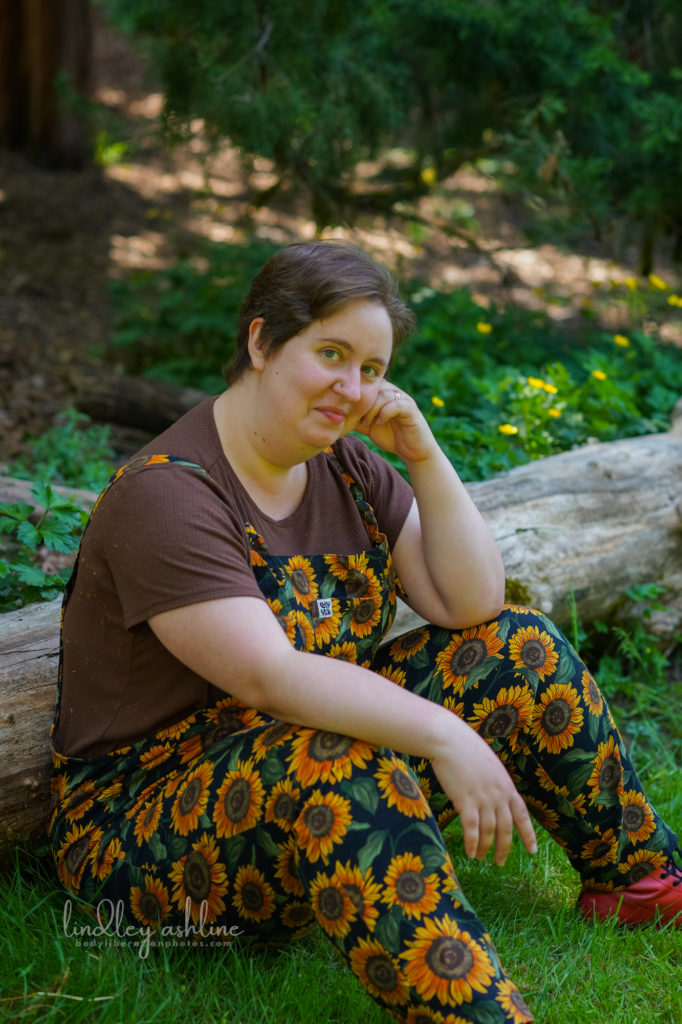
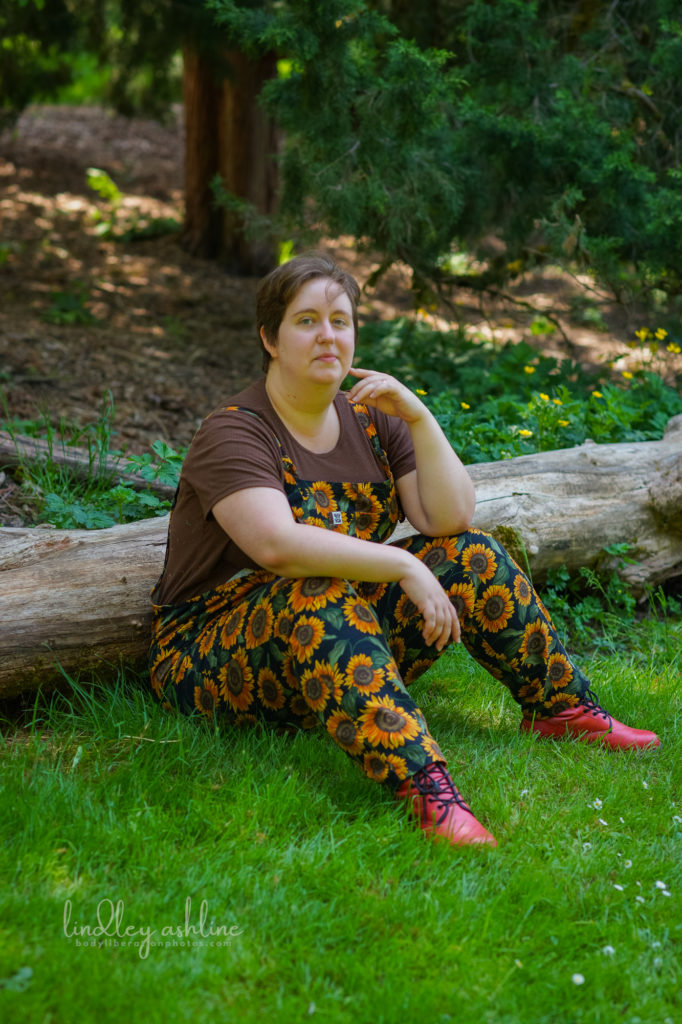
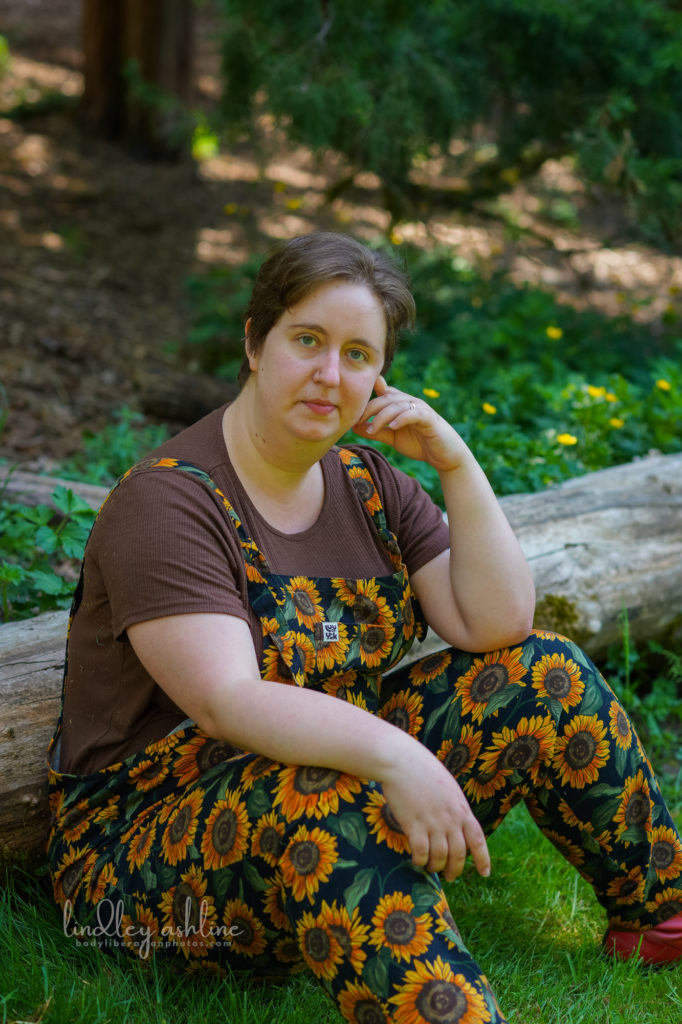
4. What’s your most popular service, or the one you most enjoy providing?
The bread and butter of my business is one-on-one weekly coaching with the majority of my clients, and I absolutely love being able to work that closely with people. I get to help folks keep momentum and make breakthroughs week after week, and I can notice wins and shifts that are happening before the client is even aware that something has changed. I love celebrating wins with them and puzzling out how to adapt my toolbox to fit each client’s unique brain, history, and goals.
I hope one day to expand to offering more group-based experiences, workbooks, body doubling collectives, seminars, and more, but I hope I never lose that focus on the one-on-one connection.
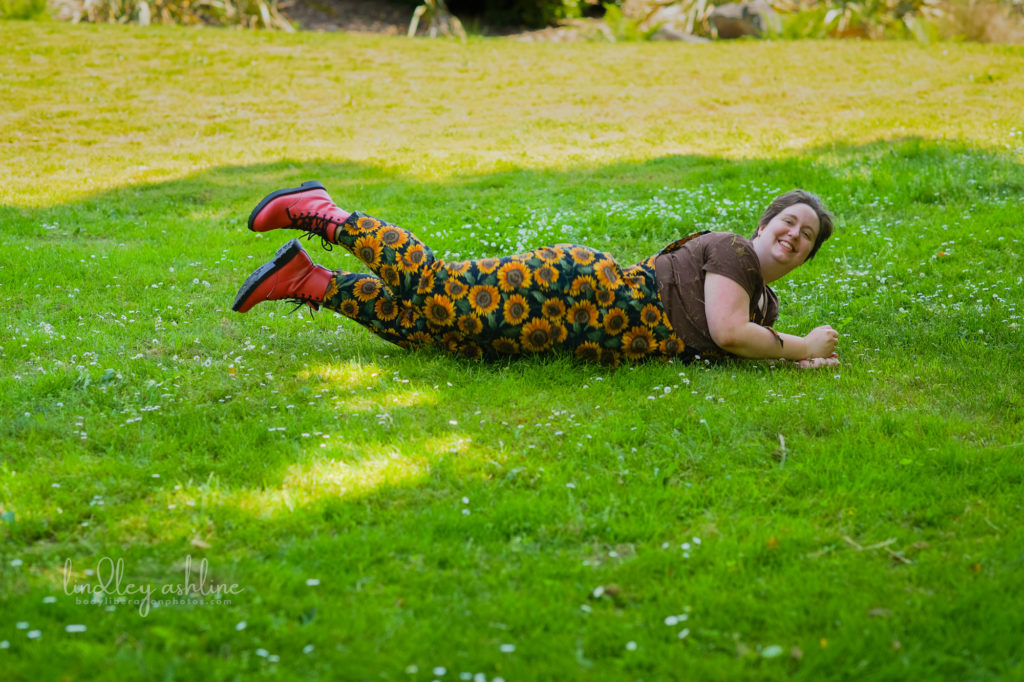
5. How does body positivity or fat positivity make your business different from others in your field? What has your experience been like?
I have SO MANY thoughts here, I tried to not write a whole dissertation about it, but I don’t know if I was entirely successful. I started my own coaching journey by dismantling my own internalized fatphobia and healing my own body image, which means the principles of body positivity are integrated into my work in a couple key ways:
1. I have an intimate understanding of how our socialization under oppressive systems programs our brain from the get go. The same impacts on your brain from internalizing harmful messages about your identity apply across marginalized groups: internalized ableism, homophobia, racism and so on have very similar effects on the way your brain processes the circumstances in your life, just with slightly different core thoughts. There’s always a level of feeling like there’s something I have to do to deserve love, respect, and attention, and a bunch of moral judgments on myself and others for not meeting an impossible metric, whether that’s being active enough, producing enough things of value, eating “correctly,” communicating in a neurotypical way, or something else.
2. There are many parts of the coaching circles that lean too heavily on “if you just fix your thoughts everything in your life will be amazing.” For marginalized communities like fat folks, we still live in a world where people will see us differently, we will be unfairly impacted by the systems that marginalize us, and no amount of thoughtwork can change that circumstance. Weaved throughout my coaching is the acknowledgement that no amount of thoughtwork will fix sizeism or ableism (or any other ism), and that life will still be full of hard situations and negative emotions. I just want to help you be able to manage those situations without adding to your own stress levels.
3. Because the fat positivity movement is intricately tied to disability advocacy and dismantling internalized ableism, true body positivity must include making peace with the fact that health is individual and that there’s nothing my body needs to do or not do to make me deserve love, respect and support. This parallels directly to neurodivergence, it’s just the brain instead of the body that is a moving target, and many of my clients are members of both communities, so the same frustrations pop up around both body and brain.
Without my own work in body positivity circles, I wouldn’t have the deep understanding of that frustration and how to shift towards neutrality and acceptance.
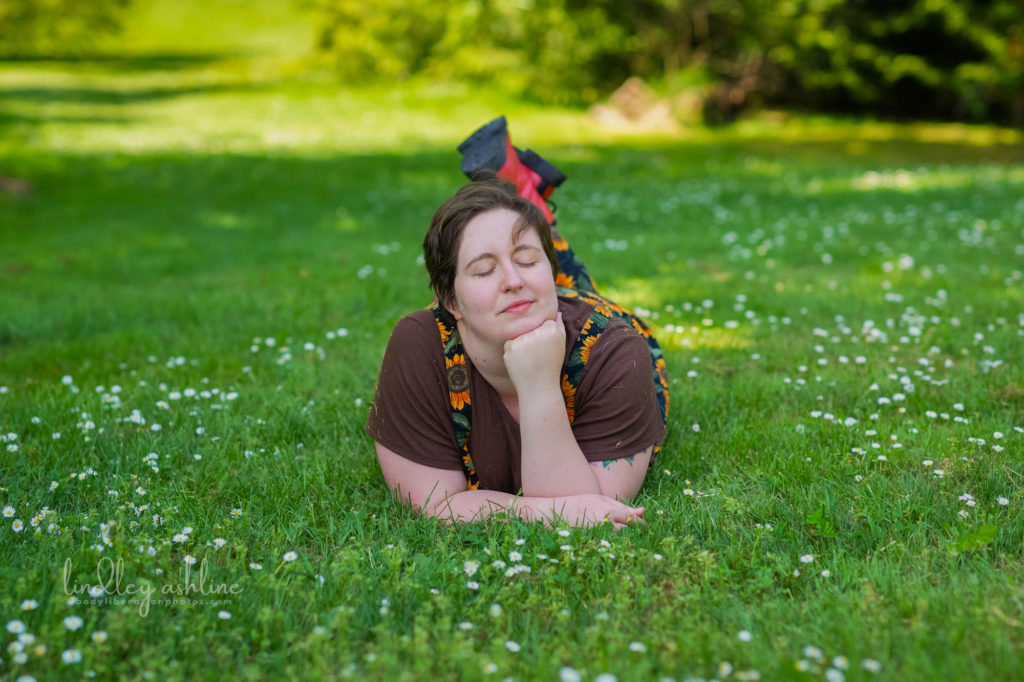
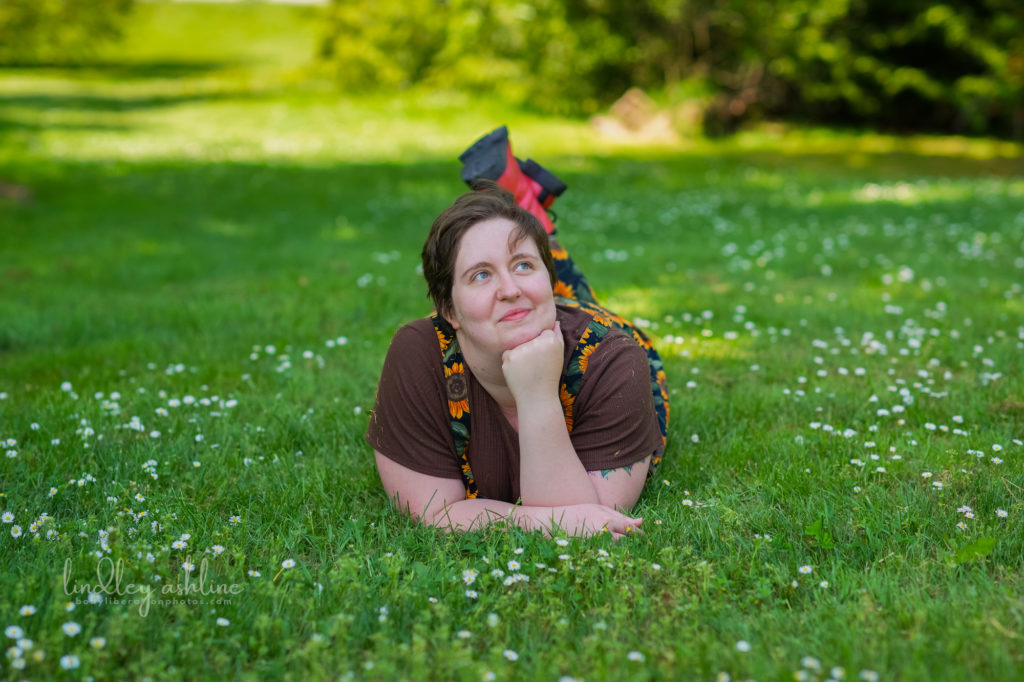
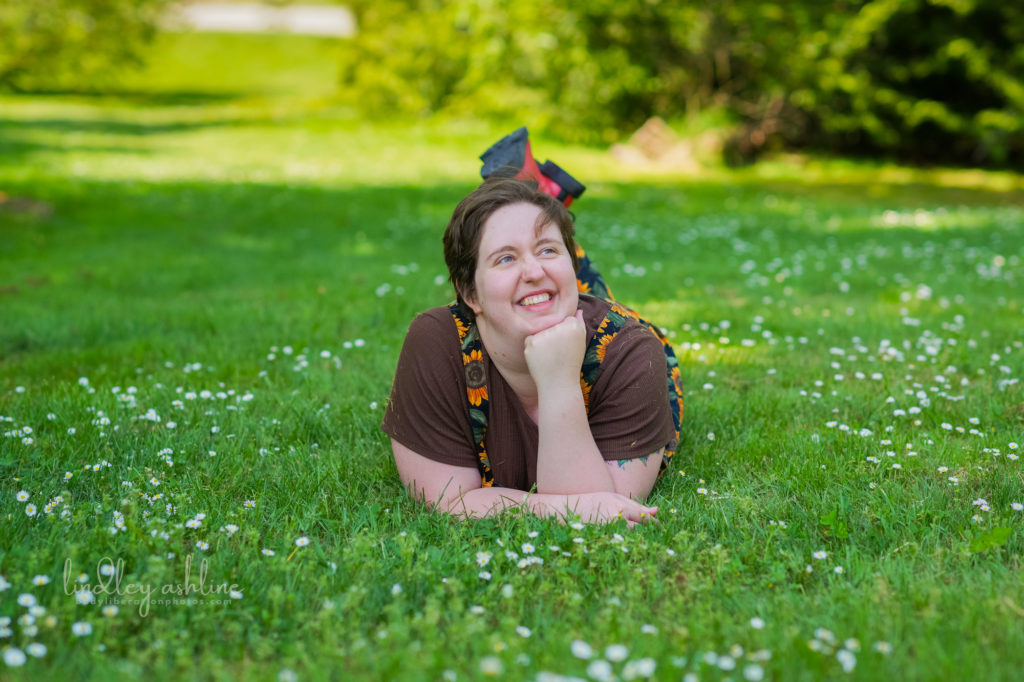
6. Can you share an instance where you made a real difference for a client, or had some really great feedback from them about your body-positive work?
(CW: medical event, talked about in abstract)
I had a client go through a big health event last year, big enough that we put our normal work on neurodivergence aside to just focus on managing the emotions around big health things. The work we did using somatic tools to bring up all the fear, overwhelm, anxiety and grief every week made a huge difference in their experience. We repeatedly agreed that without the safe space and external moderator to help keep emotional work from getting overwhelming, they wouldn’t have been able to process and move through all of the huge existential fear, and the whole journey would have been significantly more miserable and taxing on their nervous system.
Our work allowed them to find moments of peace, and feel agency and certainty in their ability to navigate the experience and lean on their loved ones without feeling like a burden the whole time.
I had another client have a truly exciting breakthrough recently: We had spent several weeks playing at different angles of feeling stuck on being afraid at looking at themselves and doing work between sessions, and when I asked them “Why look at yourself?” a tentative voice popped up with “Because maybe I’m cool and worth knowing?”
That one small and seemingly inconsequential thought was a surprise: something they’d never been able to believe before, and has since unlocked a whole cascade of feeling more empowered to deal with health stuff and motivate themselves to use self-care tools and practice helpful mindsets outside of sessions. Those shifts that feel small are often the most life-changing and powerful, and being able to dig down to that shift by asking the right questions and then capitalize on that potential to build motivation for other things is one of my favorite parts of coaching.
(Both instances are shared with consent!)
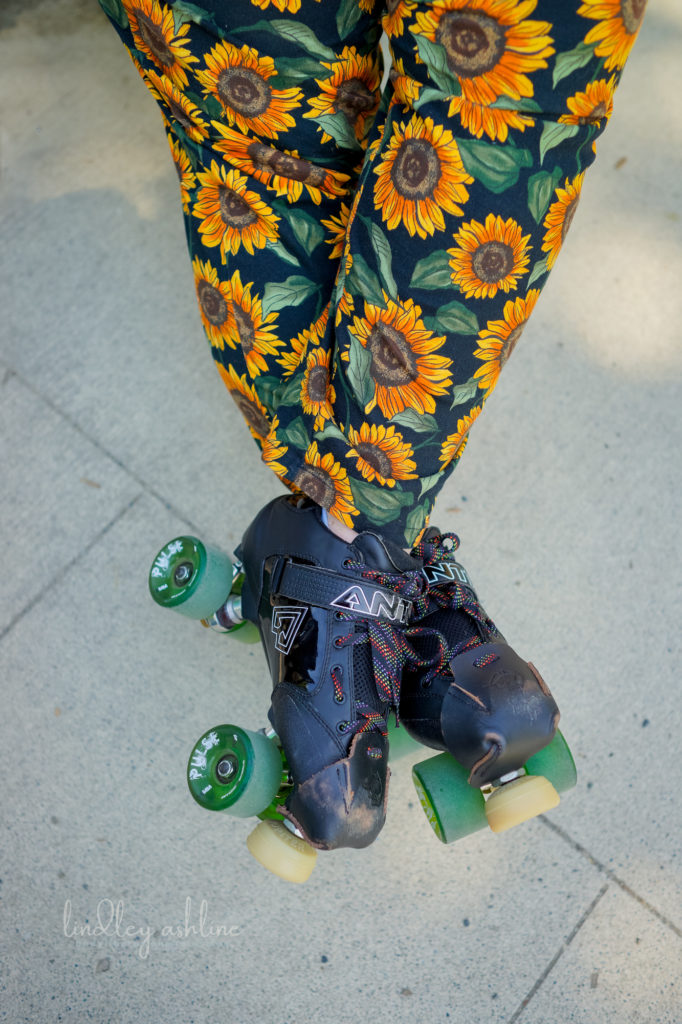
7. How did you discover body acceptance or body positivity personally? What kind of difference has it made for you?
I’ve already mentioned that body positivity was the first subject I tackled with thoughtwork personally: my thoughtwork teacher Kara Loewenthiel is also fat, and has a whole course about mindset shifts towards body positivity. I cannot overstate how completely body acceptance has changed my life. Without going into the potentially triggering nitty gritty, when I got through the bulk of my thoughts about my relationship to food and my body that had led to so much pain and self-abandonment, I realized there was another layer of work underneath it: gender dysphoria. The dysmorphia vibes of being unhappy with my body in general completely masked the dysphoria component underneath it.
Simply put, if I hadn’t done the body positivity work, I likely would never have realized I am nonbinary, I wouldn’t be on testosterone or post-top surgery, and I wouldn’t be exploring clothing that feels more comfortable and still gender affirming. The kick of self-confidence and love I got from looking in the mirror and honestly believing “my body is a work of art” hit my sensitive nervous system like a drug made of dopamine, and made me want to unpack every area of my self-judgment in the same way.
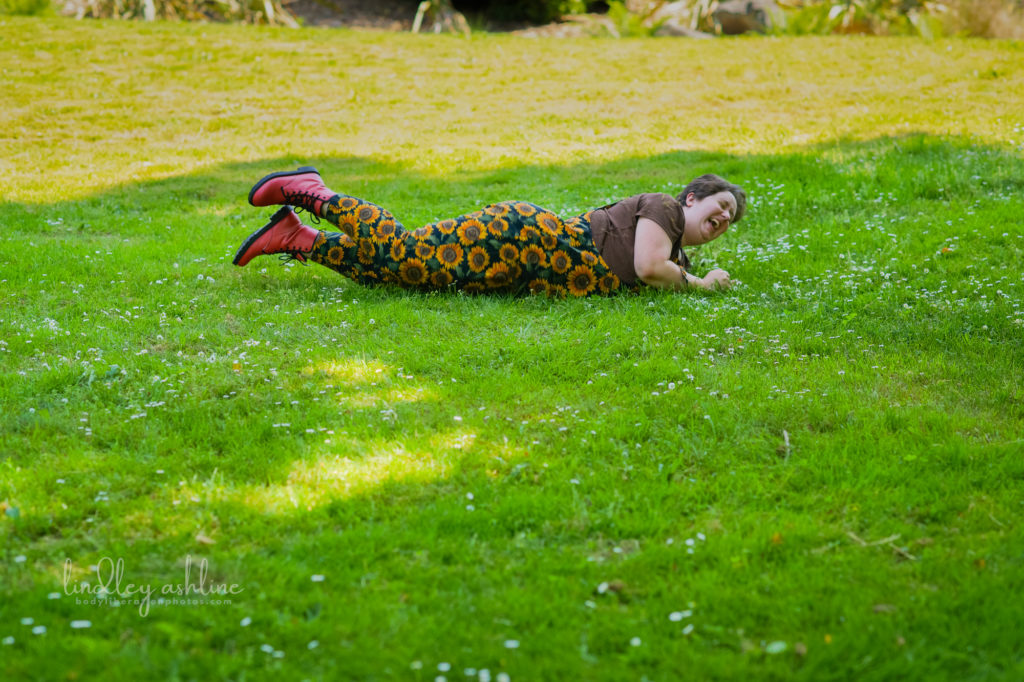
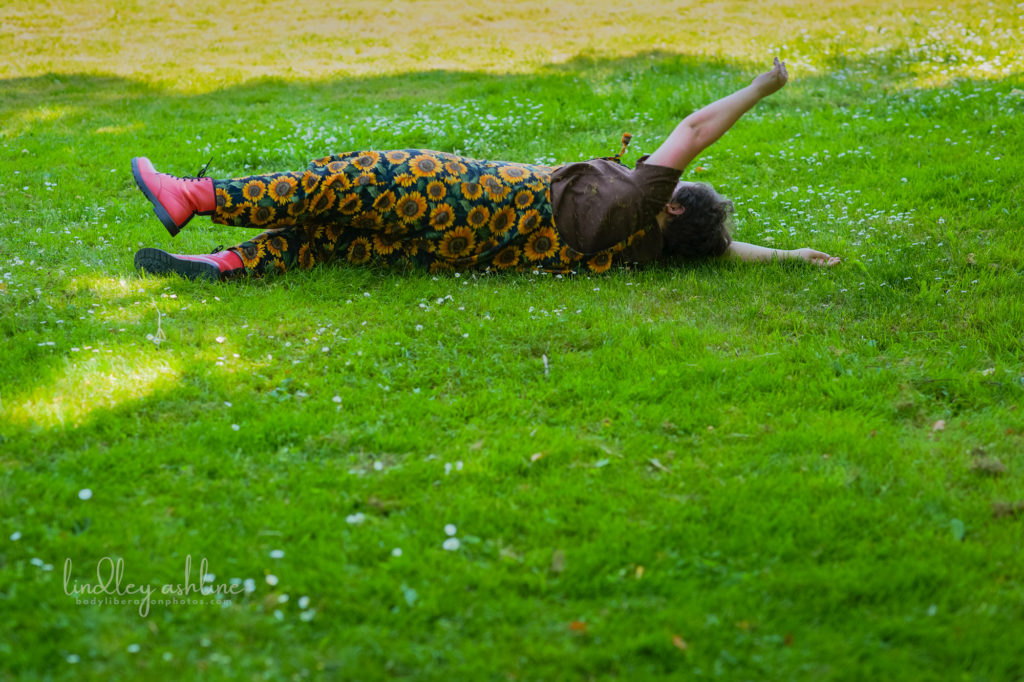
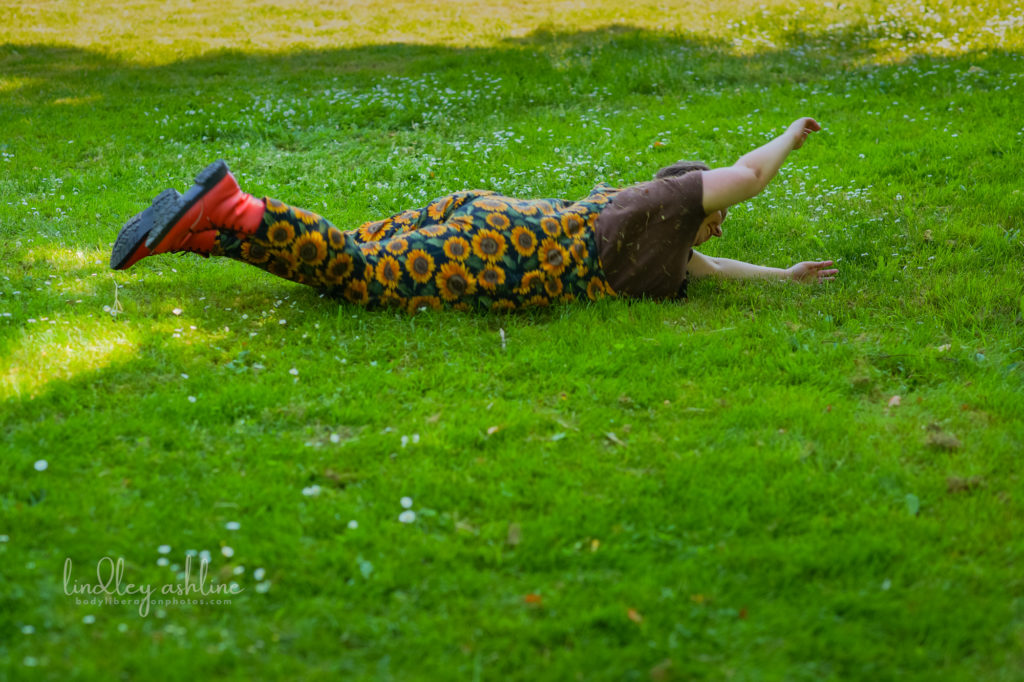
8. What advice do you have for other people who are learning to love and accept their bodies?
- The smallest step you can think of for starting the journey, make it five times smaller. Especially for beliefs that are deeply ingrained from a lifetime of absorbing harmful messages, this shift isn’t slow, and trying to do everything right now is going to lead to exhaustion, overwhelm, and avoidance.
- Surround yourself with media that supports the goal. This likely isn’t new information, but I can’t overstate how much easier it is to accept my own body if I can look at other bodies that are like mine and work on accepting them first. I still regularly seek out plus-size transmasc bodies on the hard brain days, because seeing that they’re beautiful is a much easier first step than skipping straight to accepting mine.
- Get support and do the work in community! No matter how self-aware you are and how many resources you absorb, there will always be blind spots that you don’t notice that keep you stuck, or beliefs that you think are true facts until someone points it out. It’s so much easier to keep motivation on the journey through the really hard days if you aren’t doing it alone.
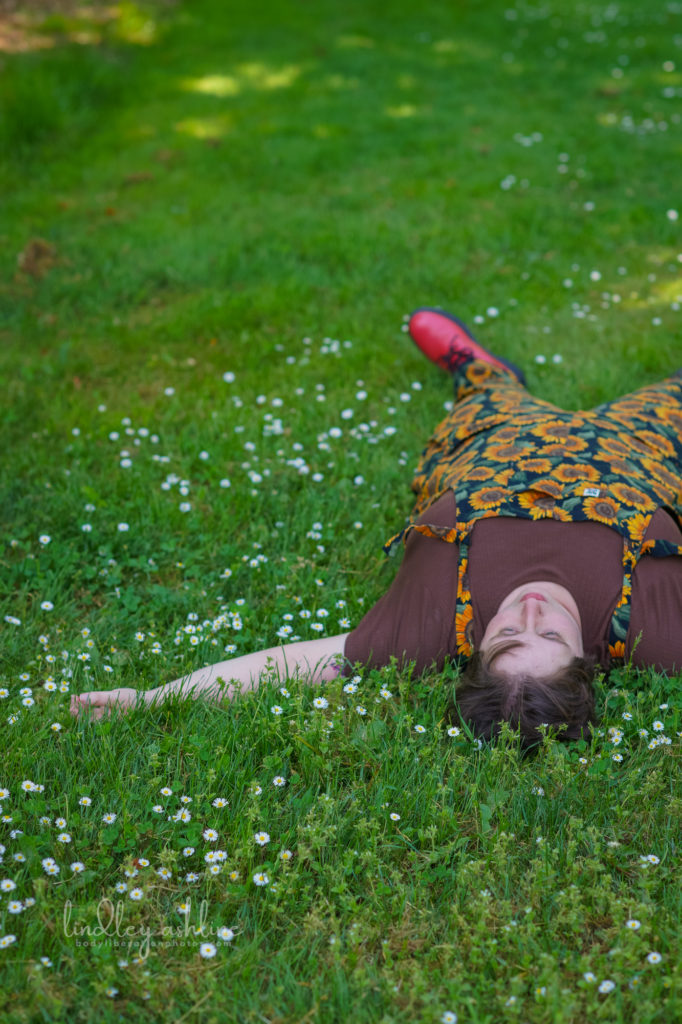

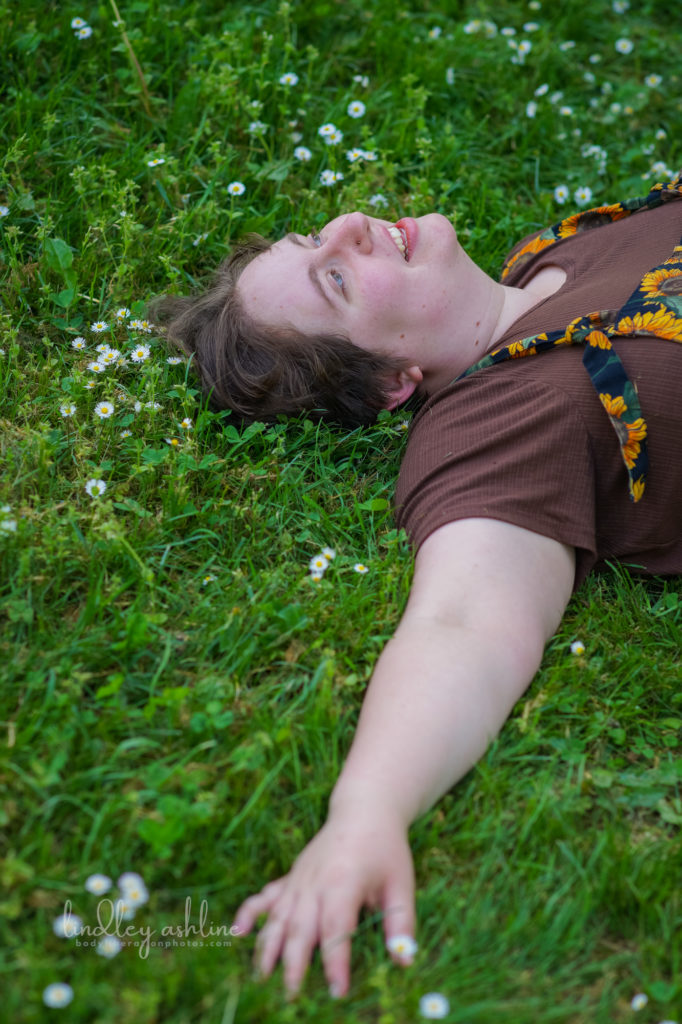
9. What advice do you have for other business owners who’d like to incorporate body acceptance into their work?
- Apply the work to yourself first! It’s hard to incorporate tools if you’re still stuck in the internalized oppressive mindsets, and you won’t know what tools or formats work well for your audience unless you know if they work for you. The same is true for sticking points and blockers.
- You don’t have to be perfect to implement things. A lot of people, myself included, get stuck in the perfectionist mindset that I have to be an expert on all the things before I can even begin to speak up, or people will think I’m a fraud. There’s a challenging online culture that perpetuates the expectation that you should be an expert, but it’s just not realistic. My favorite piece of coaching advice from a mentor was something like “the best coaches aren’t perfect at doing the thing, because they’re terrible at explaining the thing to someone who’s new at it. The best coaches are about 10% of their students: you can remember being where they’re at, you can describe how you got to where you are, and you have some tools that can help them get one step further.” Showing up imperfectly and being willing to correct and adjust when needed does more good for the world than hiding until everything is perfect (because that’s never happening).
- There’s no one right way to do it! You should aim to listen to marginalized voices and minimize harm, but no advocacy community is all on the same page for the one single best way to work towards the larger social goals, and no matter how you approach the work, someone’s going to have an opinion about it. The people who resonate with your work will resonate with it, and the people don’t might be vocal, but then they’ll go elsewhere.
- Through any kind of advocacy work, the most important work to do for yourself is to find a solid core of self-confidence and trust in your own worth, and to keep building up that trust in your infinite worth. You’re going to mess it up sometimes, people are going to have opinions, and you need to be able to find your way back to not letting failures tear you apart: find the therapist, coach, or community that helps you build this inner certainty and lean into this work before anything else.
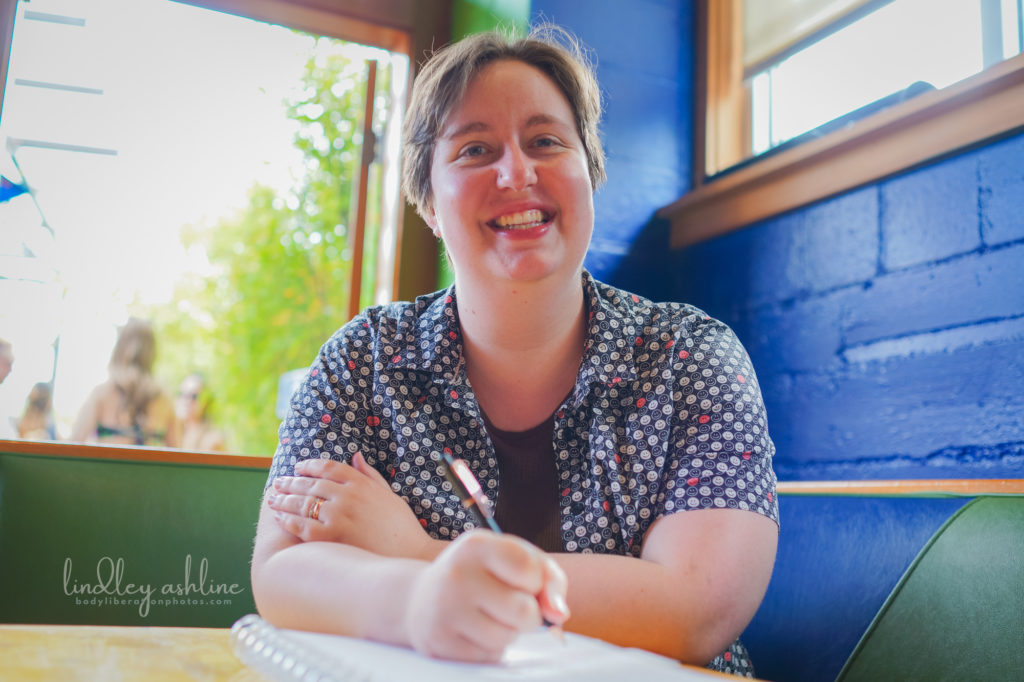
10. Where can we find more of your amazing work?
The best way to keep in the know about what I’m doing is to get on my mailing list! While my business is currently focused on 1:1 coaching with some content creation, I’m building towards some super cool programs, workbooks, releases, and collaborations in the future. These releases and highlights from my blog posts will go out to my mailing list first. Even if you aren’t my target audience, a lot of my tools and content are universally helpful for almost any brain, especially those of us living in marginalized identities. My content will also be teased and linked on social media as often as I can find the spoons for it, so follow any/all of my socials if your inbox is too crowded!
Find Kyra at:
- Website: https://www.joyfuldivergence.com/
- Facebook: https://www.facebook.com/joyfuldivergent
- Instagram: https://www.instagram.com/joyfuldivergent/
- Tiktok: https://www.tiktok.com/@joyfuldivergent
Hi there! I'm Lindley. I create artwork that celebrates the unique beauty of bodies that fall outside conventional "beauty" standards at Body Liberation Photography. I'm also the creator of Body Liberation Stock and the Body Love Shop, a curated central resource for body-friendly artwork and products. Find all my work here at bodyliberationphotos.com.

